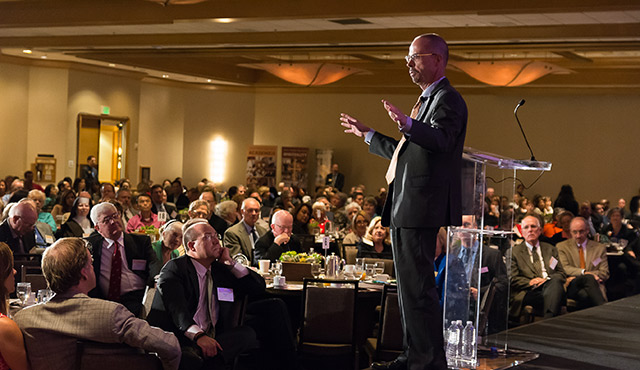A banquet room filled with hundreds of the most prominent business figures in the Orange County area heard lessons on business leadership and innovation from the fields of Nicaragua to the halls of the Vatican April 17 during the 13th annual Orange Catholic Foundation Conference on Business and Ethics at the Hilton Costa Mesa.
The event, billed as “a forum for responsible leaders,” raises funds each year for deserving Catholic elementary school students, honors businesspeople for adherence to ethical practices and presents keynote speakers who address responsible business leadership.
One of the speakers took his leadership observations straight from the top: Pope Francis. Veteran Vatican journalist John Allen told the sold-out gathering that over the course of Francis’ first two years in the papacy three conspicuous leadership strategies have emerged, and these strategies account, in part, for a level of popular approval (about 90 percent among American Catholics and 78 percent among Americans in general) that is “nothing short of staggering.”
The pontiff, said Allen, is “successfully re-branding the Church” and has “created a new missionary moment for Catholicism.” As a result, he added, “Today there is a kind of lens of sympathetic new interest” in the Church across all populations.
How has Francis done it? Allen, an author and an associate editor of The Boston Globe and the senior Vatican analyst for CNN, listed three specific approaches to leadership.
First, he said, the pope leads by example. He cited Francis’ now-familiar “gestures of personal simplicity and humility”: riding with the cardinals on the shuttle bus after his election and personally paying his hotel bill, asking the faithful to pray for him in his first words from the papal balcony, eschewing the papal palace for humbler living quarters.
Are these gestures genuine or calculated? Both, said Allen. “Beneath that humble, simple exterior lies the heart and mind of a brilliant Jesuit politician.”
The pope, said Allen, is aiming for a “Copernican revolution in the Church” and “he has to do it by his own example.”
Francis’ second significant leadership lesson, said Allen, is one common to all Jesuit superiors: “consult widely, but make the decisions yourself.” The pope not only stays in close contact with a committee of bishops who are “out in the trenches” rather than Vatican insiders, and also maintains a pipeline of communication directly to the faithful. Allen referred to Francis as “the cold call pope” for his habit of picking up the phone and calling individuals without advance notice. “He wants to be sure he remains in contact with ordinary people,” said Allen. “It’s an important aspect of governance.”
Finally, said Allen, Francis is “not afraid to ignore advice when there’s something important at stake.” The bottom line: trust your gut.
The conference’s second keynote speaker, Dr. Carolyn Woo, also advocated a three-point leadership approach in addressing the scourge of extreme poverty throughout the world. Woo, the president and CEO of Catholic Relief Services, said CRS attacks the issue by asserting that extreme poverty 1) “is not OK”, 2) “It is my problem”, and 3) “We can solve it.”
It is this approach, she said, that CNS is advocating for businesses as well, through a business-CNS partnership “that we call shared value” and that is based on Catholic social teaching regarding the “preferential option for the poor.”
“For all the work that we do,” she said, “we need business as partners.”
Such programs as sustainable land use in Nicaragua—where a failing maize farmer was given seed and instruction to plant passion fruit instead and subsequently succeeded—to 200 businesses in El Salvador working with CNS on training programs for at-risk youth, the partnership between public and private entities works, said Woo.
“Charity is not only personal in nature,” she said, quoting Pope Benedict, “it’s also institutional in nature.”
Business sometimes is thought of “as a necessary evil,” said Woo, “but business should be a necessary good—a force for good to honor God.”
The two businessmen who were presented with the Bishop’s Award for Exemplary Business Integrity at the conference were cited for putting Woo’s words into practice. They were S. Paul Musco, the founder of Gemini Industries and Relief Pod International and Richard M. Helm, the division president and CEO of the Western Region of Clark Construction.
Also honored with the Farmers & Merchants Bank Lifetime Achievement Award were the Sisters of St. Joseph of Orange.
The conference raised $280,000.

